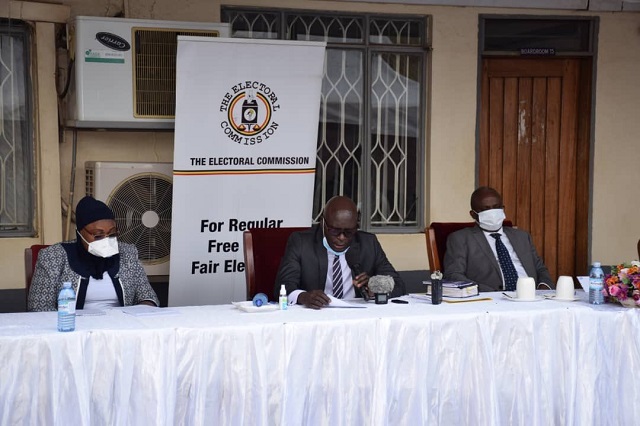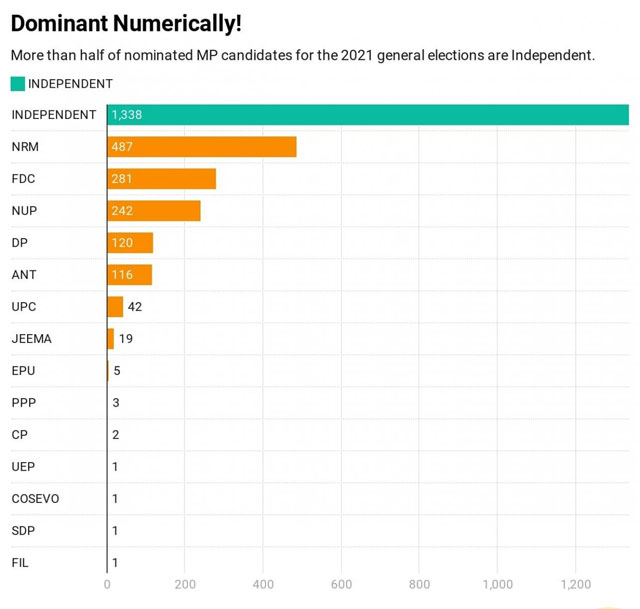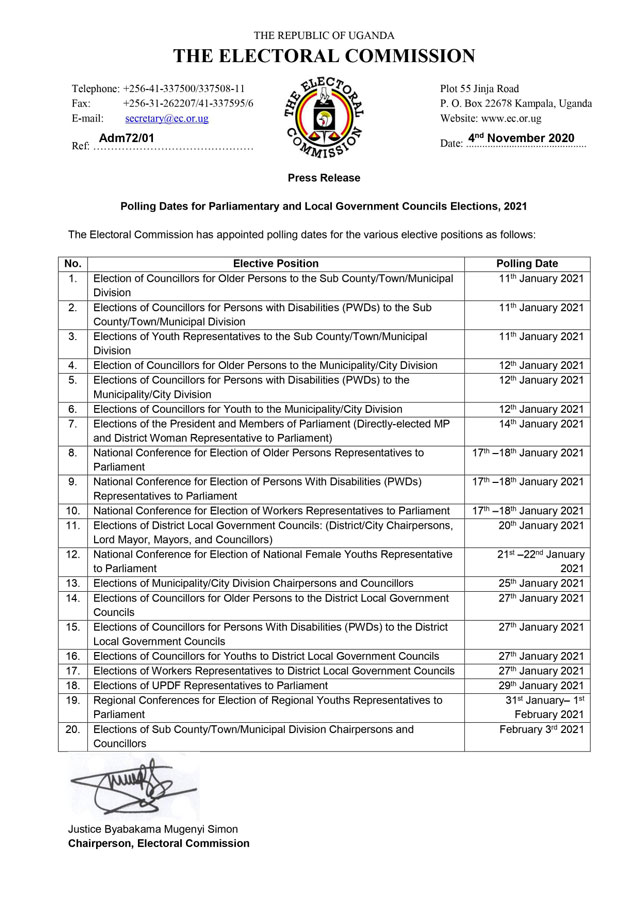
 #Uganda
#Uganda  #Election DATES
#Election DATES
1⃣  Jan 11,2021
Jan 11,2021  Councillors for older persons
Councillors for older persons
2⃣  Jan 11,2021
Jan 11,2021  Councillors for PWDs
Councillors for PWDs
3⃣  Jan 11,2021
Jan 11,2021  Youth Representatives
Youth Representatives
4⃣  Jan 12,2021
Jan 12,2021  Councillors for older persons
Councillors for older persons
5⃣  Jan 12,2021
Jan 12,2021  Councillors for PWDs
Councillors for PWDs
6⃣  Jan 12,2021
Jan 12,2021  Councillors for Youth
Councillors for Youth
7⃣  Jan 14,2021
Jan 14,2021  Elections of President and MPs
Elections of President and MPs
8⃣  Jan 17-18,2021
Jan 17-18,2021  National Conference Older persons
National Conference Older persons
9⃣  Jan 17-18,2021
Jan 17-18,2021  National Conference PWDs
National Conference PWDs

 Jan 17-18,2021
Jan 17-18,2021  National Conference Workers
National Conference Workers
1⃣ 1⃣  Jan 20,2021
Jan 20,2021  Mayors, District Chairpersons
Mayors, District Chairpersons
1⃣ 2⃣  Jan 21-22,2021
Jan 21-22,2021  National Conference Female Youth
National Conference Female Youth
1⃣ 3⃣  Jan 25,2021
Jan 25,2021  Municipality & City Divisions chairs
Municipality & City Divisions chairs
1⃣ 4⃣  Jan 27,2021
Jan 27,2021  Councillors for older persons District
Councillors for older persons District
1⃣ 5⃣  Jan 27,2021
Jan 27,2021  Councillors for PWDs District
Councillors for PWDs District
1⃣ 6⃣  Jan 27,2021
Jan 27,2021  Councillors for Youth District
Councillors for Youth District
1⃣ 7⃣  Jan 27,2021
Jan 27,2021  Worker Reps to District LG Councils
Worker Reps to District LG Councils
1⃣ 8⃣  Jan 29,2021
Jan 29,2021  Election of UPDF MPs
Election of UPDF MPs
1⃣ 9⃣  Jan 13 & Feb 1,2021
Jan 13 & Feb 1,2021  Regional Conferences Youth MPs
Regional Conferences Youth MPs
2⃣ 0⃣  Feb 3,2021
Feb 3,2021  Sub-county/town/municipal Division chairs
Sub-county/town/municipal Division chairs
Kampala, Uganda | THE INDEPENDENT & URN | Uganda’s electoral commission has confirmed the polling dates for the 2021 Parliamentary and Local Government Councils Elections.
The elections will stretch for three weeks, starting January 11 with election of councillors to the sub-county, town and municipal divisions and February 3, 2021 with elections of Sub-county, town and municipal Division chairpersons and councillors.
The main election is set for January 14, where the President, Members of Parliament directly elected and women representatives, will be picked.
Elections to be dominated by Independents

More than 50 per cent of parliamentary candidates in the 2021 elections are Independents, according to data compiled by Uganda Radio Network. Data indicates 1338 of the 2,659 parliamentary candidates are Independents representing 50.3 per cent.
The remaining 1,321 comprise the National Resistance Movement (NRM) 487 candidates, Forum for Democratic Change (FDC) 281, National Unity Platform (NUP) 242, Democratic Party (DP) 120 and Alliance for National Transformation (ANT) 116.
Others are Uganda People’s Congress (UPC) 42, Justice Forum (JEEMA) 19, Ecological Party of Uganda (EPU) 5, Peoples Progressive Party (PPP) 3, and Conservative Party (CP) 2 while Uganda Economic Party (UEP) Congress Service and Volunteers organization (COSEVO) Social Democratic Party (SDP) and Forum for Integrity in Leadership (FIL), have one candidate each.
The data also shows that the number of independents has continued to rise as more Ugandans seek to participate in the general elections compared to the previous polls. In 2016, 1,747 people contested for parliamentary seats. Of these 909 were independent candidates.
According to the data, Jinja Division North has the highest number of independents with 12 candidates followed by Samia Bugwe County North with 11 independents and Kigulu County South with 10 Independents. Others are Bbale County, Nakawa West, Kigulu North with 9 independent candidates each.
Bunya East, Toroma County, Rubaga South, Laroo-Pece division, Bukooli Central and Kibuku Woman parliamentary race have 8 independent candidates. Aswa, Bugabula South, Busiki North, Budaka Woman MP, Namayingo South, Bunyangabu County and Rukungiri and Busia Municipality have also attracted 8 independents each.
Political experts say there is need for Parliamentary reforms to cater to the growing number of independent candidates, while others say there is need for parties to examine themselves given the huge number of independents.
Frank Rusa, the Country Representative Netherlands Institute for Multiparty Democracy attributes the huge number of independents on the failure by political parties to penetrate the population because of the failure to perfect internal democracy.
Rusa, who is also the Executive Secretary of Interparty Organization for Dialogue (IPOD), says that the fact that political parties are targeted by security agencies makes it safer for one to contest as an independent. He says that presence of many independents in parliament undermines party positions and fuels individual convictions.
Crispin Kaheru, an election expert says that the many Independent candidates mean that people continue to lose interest in political parties. He says Uganda is still caught up in the individual merit system and movement system among others.
Kaheru says that it looks like parliament will have more independents compared to the opposition and possibly the NRM, which might trigger constitutional changes.
Yasin Ssekamatte, a political analyst says parties have definitely failed to meet the needs of the candidates. He says the parties are not doing enough for candidates and thereby can’t influence their decision.
In August this year, the former Leader of Opposition in Parliament, Prof, Morris Ogenga Latigo, who decided to abandon FDC and run as an independent for the Agago North parliamentary seat, said political parties are no longer serving their purpose.
“I am not joining any party; I prefer to serve the country at my own merit. I think there is no party I can join as most of them don’t serve any purpose… See what is happening in these parties, the fighting; very shameful for some of us who look at the bigger picture for this country” Ogenga said.
****
Data Research Contributors
Christine Kabazira & Junior Twinamatsiko

The post Uganda Electoral Commission confirms polls dates appeared first on The Independent Uganda:.
from The Independent Uganda: https://ift.tt/372wvHK
0 Comments